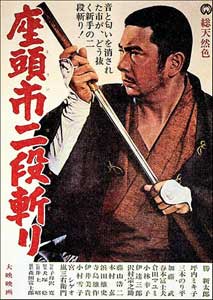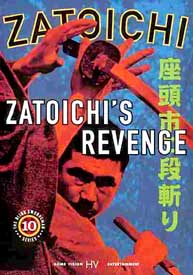 When someone asked why Zatoichi has no topknot (as do the yakuza characters as well as the samurai) I realized that us "old fans" of jidai-geki take for granted things that are puzzling to newer viewers. When someone asked why Zatoichi has no topknot (as do the yakuza characters as well as the samurai) I realized that us "old fans" of jidai-geki take for granted things that are puzzling to newer viewers.
So as prelude to a review of yet another Zatoichi episode, some in-depth background about the historical position of "blind masseurs" in medieval Japan will go a long way toward understanding the fictional character's realistic underpinning.
The reason Ichi has no topknot is because the masseur occupation was overseen by a Buddhist society in Kyoto which established the blind masseur guild (or todoza) with prefectural colleges throughout the country. They enforced regulations beginning at some point in the Muromachi period (1336-1573). All members were officially, even if not by behavior or training, Buddhist monks, thus head-shaven.
In the first two Ichi episodes, the only ones in black & white, he's very closely shaven. But in most episodes he has let his hair grow a bit longer than would likely be the case historically. It's easy enough to believe Ichi's lazy about shaving his head, & it permitted star Shintaro Katsu to play scads of other roles (ten films in a year would not be unusual for workaholic Katsushin).
But in all cases he would be without a pony tail or topknot, which was in fact a potent symbol culturally. Consider for example if a man of station has died far from home. His entire body need not be transported home, but only his topknot, which would be enshrined. For a monk, inclusive of monk-like masseurs, to have no topknot was like an announcement of having died; to become a monk was called "dying to the world." And many privileges of being alive were lost.
The masseur guild was a branch within the blind musicians guild initially of biwahoshi who were blind biwa players who specialized in performances of the national epic Heiko monogatori. Ichi encounters just such a biwahoshi in the thirteenth film, Zatoichi no uta ga kikoeru (The Blind Swordsman's Vengeance, 1966) The guild later accepted memberships from all sorts of itinerant occupations for the blind, including sundry sorts of musicians & certain types of health-providers. Because massage was regarded a health therapy, it overlapped with accupuncturists & moxa providers who were sometimes blind guild members too.
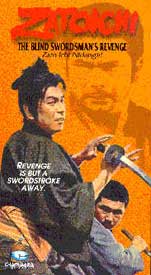 Itinerant monks inclusive of masseurs were not permitted to own property or hold public office, being as they were dead to the world after they took the tonsure (the shaven head). If ever they ceased to be wanderers, they could settle only in a monastary. Itinerant monks inclusive of masseurs were not permitted to own property or hold public office, being as they were dead to the world after they took the tonsure (the shaven head). If ever they ceased to be wanderers, they could settle only in a monastary.
Even travelling, most monks, same as actors or outcasts, were not permitted to stay in decent inns, & we sometimes see Ichi or other masseurs staying in brothels (where they can get work from the women's patrons), though Ichi prefers to stay at some yakuza/gangster headquarters since he's very much plugged into the gambler's world. Masseurs did go to nice inns, where they plied their trade upon invitation, but would otherwise have to stay at a temple, shrine, health spa, bordello, or the private home of an acquaintance.
In many an episode we see Ichi taking refuge in some roadside shrine, some of them very tiny. These were expected hobo shelters but Ichi by right of easily winning at dice or from his work as a masseur does usually have some money. He just has no right to check into a decent inn as more than a working masseur (he's occasionally invited to camp out in an inn's kitchen)
By the Tokugawa era, some of this begin to change for the guilds' highest ranking members, but not for the low-ranking. High-ranking guild members could become provincial teachers of massage, allowed to settle down with private homes, & were even financed by the government, though they had been around a long time without government support.
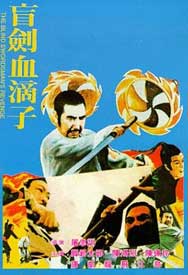 Zatoichi's name refers to the lowest position in the guild, a zato or fluttering bat, though in Zatoichi's case he was the "number one wild bat" or "Foremost Low-ranking Masseur," with "Ichi" meaning "One." So his name is a minor irony, a common enough contradiction in the construction of names. By a close pun "Zatoichi" also means simply "Guild Member." Because he is a zato, he cannot legally settle in one place. Zatoichi's name refers to the lowest position in the guild, a zato or fluttering bat, though in Zatoichi's case he was the "number one wild bat" or "Foremost Low-ranking Masseur," with "Ichi" meaning "One." So his name is a minor irony, a common enough contradiction in the construction of names. By a close pun "Zatoichi" also means simply "Guild Member." Because he is a zato, he cannot legally settle in one place.
Most wandering masseurs would not be gamblers & would not have yakuza connections, but certainly many individuals marginilized by the class system did end up as members of gang organizations. Ichi's gang connections means his lifestyle overlaps that of a matatabi or wanderer, generally a farmer who left the farmlife to live on the road, obtaining travel permits by means of bribes, or travelling by back roads that had no government stations.
The traditional garb of matatabi is frequently seen in Zatoichi films: a large blue cape, flat-topped straw hat, & kimono hiked up so that legs are bared, permitting long strides. The image of hats & capes hastily tossed aside is a typical visual cue for swordfights to begin. Like Ichi, matatabi travelled the yakuza underground, & would be welcomed for a night's lodging in any yakuza headquarters, though a debt of obligation for the loding could become a serious burden of the godfather/oyabun made some horrible command the next day.
One of the great films to focus on the lives of this class of wanderer was Kon Ichikawa's Matatabi (The Wanderers, 1973).
Ichikawa undermines the romance of the matatabi, who would in reality have been subject of easy arrest for having left their native provinces; as ex-farmers lacked skill to protect themselves when getting in inevitable fights with tougher yakuza; & were always low men on the totem pole. Films that preserve the romance of the matatabi as spectacular anti-hero include Kinnosuke Nakamura as the Yakuza of Ina (Yataro gasa, 1960), Bunta Sugawara as Kogarashi Monjiro (1972), & an incredible trilogy starring Yoshio Harada as the bloody avenger Jokichi of Mikogami, beginning with Trail of Blood (Mikogami no Jokichi, 1972)
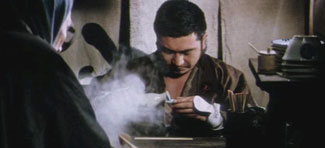 There were highly restrictive regulations in the Tokugawa era that prohibited peasants (or anyone really) from moving from one prefecture to another without hard-to-get travel permits. Mizoguchi's Samurai Rebellion (Joiuchi: Hairyo tsuma shimatsu, 1967) hinges on the difficulty of even a well-placed samurai getting across a border to the next prefecture without such a permit. The exceptions were itinerant monks, so right away there was a unique privilege to being superficially "a monk." Thus Zatoichi, denied a home by his official categorization as itinerant monk, has at least gained considerable liberty of travel. There were highly restrictive regulations in the Tokugawa era that prohibited peasants (or anyone really) from moving from one prefecture to another without hard-to-get travel permits. Mizoguchi's Samurai Rebellion (Joiuchi: Hairyo tsuma shimatsu, 1967) hinges on the difficulty of even a well-placed samurai getting across a border to the next prefecture without such a permit. The exceptions were itinerant monks, so right away there was a unique privilege to being superficially "a monk." Thus Zatoichi, denied a home by his official categorization as itinerant monk, has at least gained considerable liberty of travel.
The highest rank is kengyo, & in the episode of Zatoichi's adventures reviewed below -- Zatoichi's Revenge (Zatoichi nidan giri, 1963) -- Ichi's kengyo is murdered during a trip to Kyoto where he was going to provide the todoza the required payment (or bribe) to give him this high title, which in the Tokugawa era came with a little teacher's stipend in addition to considerable prestige.
Women could not join the Todoza, but there were also "nun" colleges for blind women, such as seen in Masahiro Shinoda's Ballad of Orin (Hanre goze Orin, 1977), a college of goze or blind shamisen players. Orin (Shima Iwashita) was kicked out for not being properly virginal, & eventually died on the side of the road for lack of a guild's protection.
The blind women's guild of itinerant entertainers was called Gozeza & it is conjectured the name derives from Gozen, a woman of noble disposition or origin, perhaps because the guilds were formed by highborn blind women within the Buddhist guild system. Such membership would supposedly protect such women from falling into prostitution or just being raped or killed.
 Blind guilds were once very, very numerous throughout Japan & the last Gozeza branch survived longest (into the late 20th Century) in rural prefectures of Honshu, at a time when the Todeza were already long gone (though even today, small nonprofit pseudo-todeza are still encountered to assist the blind). Blind guilds were once very, very numerous throughout Japan & the last Gozeza branch survived longest (into the late 20th Century) in rural prefectures of Honshu, at a time when the Todeza were already long gone (though even today, small nonprofit pseudo-todeza are still encountered to assist the blind).
There were similar guilds for the sighted, like the drummer's guild & many others. Not all, but the majority, required tonsure, as the outward manifestation of retirement from the world. In the beginning of Seven Samurai (Shichinin no samurai, 1954), when our hero shaves his head as part of a plan to save a child, it's so he can pose as a harmless man of low rank retired from the world. He'd have to be quite an egoless gentleman to not care that all privilege of his class went out the door until his hair grew back.
And in Masaki Kobayashi's Harakiri (Seppuki, 1962), when Tsugumo Hanshiro (Tatsuya Nakadai) took the topknots of the men he dueled, the men would not come out of hiding & be seen in such a condition. The most prideful of the lot he defeated in this manner (Tetsuro Tamba) committed seppuku rather than be seen with the badge of his class taken from him.
I trust this little history essay will be especially valuable in enhancing anyone's comprehension of any jidai-geki or period film with blind characters, such as are numerous in the genre. And now, on to the review of the tenth Zatoichi movie:
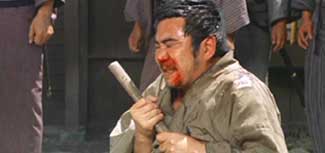 If visual beauty counts for anything, then Zatoich's Revenge gets a high accounting even at a glance, as scene after scene is framed & potographed like a work of art. If visual beauty counts for anything, then Zatoich's Revenge gets a high accounting even at a glance, as scene after scene is framed & potographed like a work of art.
Ichi's masseur's whistle is used in this film as a sort of menacing sound in the night, much as it is in Zatoichi & the One-Armed Swordsman (Shin Zatoichi: Yabure! Tonjin ken!, 1971) in which Ichi cuts down numerous foe with his whistle in his mouth. So while our character is friendly & occasionally clownish, there is also always something of the mosnter about him, the tension between Ichi's humor & kindness, & his vengefulness & violence, being vastly more intriguing than when he's simply presented as a protector of downtrodden villagers.
Excellent sets & cinematagrophy make it an especially moody & attractive entry into the series, even if by the tenth film the story is weighted down by formula. The comic opening scene, when blind Ichi loses his rice cake, & tries to cross a broken bridge, is at once heartwarming & amusing, but also manipulative & familiar, as so many films about Ichi begin with something equally cute.
When humor turns to vaiolence & Ichi kills all but one attacker, he tells the last, "Take care of your life; you have but one." We're impressed on one level, but groaning on another if this is the one's umpteenth encounter with the series.
Or consider the very clever dice game, which is another moment we've seen before & will see again:
Ichi bets on a pair of dice which are tossed, by slight of hand, into sake jar; but he cuts it open to show he really had bet on winning dice. This is a great scene, even if no different than a dozen scenes like it in episodes before & after.
There will be numerous stock characters along the way, one of the most appealing being the tough woman gambler (Mayumi Kurata) who cheats at hanafuda cards, & the least interesting being standard bad-guys. It's all leading to a climactic one-against-all battle, grotesque & gorgeous, with the world purged for another episode of all evil...though a sad lonely Ichi at his dead teacher's graveside will have gained nothing by his actions.
There's enough of Ichi in all of us, so few are the poor souls who can lave the theater totally unmoved, even though on an intellectual level we have to decide if on the given day it all seems like the same Ichi film we've already seen time & again, or if every variation of the same story isn't as satisfying as any other sort of ritual event. To me, this is such a good episode it justifies a closer look at the story line:
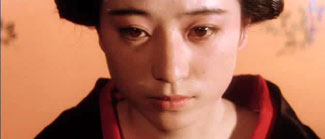 Tsuru (Sachiko Kobayashi) is the daughter of a notorious dicer, Denroku the Weasil (Norihei Miki, a superior serio-comic actor). Tsuru (Sachiko Kobayashi) is the daughter of a notorious dicer, Denroku the Weasil (Norihei Miki, a superior serio-comic actor).
A weasil is noted for cleverness, but as it has a different meaning in the west, there's one version of this film in circulation with subtitles that call him Denroku the Fox, which is more in keeping with western sentiment about which animal is most clever.
He has tried to raise his daughter well even though she has no mother; even though he has brought her up in the dubious environment of the underworld where she risks being exposed to gamblers & prostitutes.
He has managed to protect her from knowledge of the vilest aspects of the world they live in, but at age eleven she is getting harder to resrtrict what she sees, & what men of his world are apt to do.
Denroku is mostly a good man, but he is not necessarily a brave man. He has used his skills as a dicer to benefit crooked gang bosses, as he sees no alternate way of coping with the reality of how things operate.
Ichi in his official profession as a masseur first meets Denroku who needed a massage because dicing for a gambling house tires the arms & shoulders. Ichi's impressed by the devotion between him & his daughter, & ends up befriending this likeable family of two.
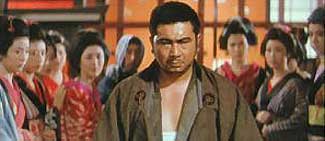 What brought Ichi to this village was his intent to visit his old massage sensei or instructor Hikonoichi (Sanemon Arashi), only to learn that Hikonoichi had recently died with debt. He'd been murdered by an unknown swordsman on the road to Kyoto. What brought Ichi to this village was his intent to visit his old massage sensei or instructor Hikonoichi (Sanemon Arashi), only to learn that Hikonoichi had recently died with debt. He'd been murdered by an unknown swordsman on the road to Kyoto.
Hikonoichi had had a large sum of money to pay the hefty fee required for his certification as Kengyo or highest ranking teacher of massage within the gild of blind masseurs. He'd been talked into this by an unctuously friendly county official & yakuza boss, Tatsugoro (Jun Katsumura), for if the journey had been successful, the debt could've been paid back very rapidly. As it stands, it cannot be paid at all.
For Hikonoichi's debt, his daughter Sayo (Mikiko Tsubouchi) was taken by boss Tatsugoro to serve an indentured period in his bordello, where she began using the name Nishikigi. Because she had been ill, Nishikigi's valuable virginity had not yet been sold, but after two weeks, Tatsugoro is impatient.
She has been promised to a government official known to harlots one & all as Lord Pervert because of his desire for the youngest fresh meat. When she balked & tried to run away, she was beaten locked up in a cage as punishment until she stops being willful.
Ichi finds her under such conditions. Humbly he addresses her, "I'm Ichi from Kosana. Do you remember me?" It was an absurd question, as he had been her first crush & she still idolized her memory of him.
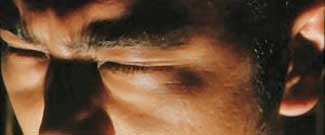 As her father signed the debt pledge, Ichi cannot just take her away by force. Her father's debt must first be cleared. As her father signed the debt pledge, Ichi cannot just take her away by force. Her father's debt must first be cleared.
Several girls at the same bordello have been beaten for trying to escape, or just out of plain cruelty of Tatsugoro.
It will slowly become clear to Ichi that they are all victims of an aggressive sort of loan-sharking designed specifically to obtain young women as veritable sex slaves, & not the result of ordinary circumstances of need.
At Tatsugoro's nearby gambling den, Ichi was having a run of luck dicing, his extraordinary hearing giving him an edge.
The house has a yojimbo (bodyguard), Koheito Kadokura (Takeshi Kato), who has been shadowing Ichi off & on. Kadokura suspects Ichi knows he was sent to kill the blind massage instructor Hikonoichi.
The boss sends for his best dicer, Denroku the Weasil. Kadokura wants Ichi to bet his canesword. Though Denroku is Ichi's friend, he knows who feeds him, so he cheats. But Ichi heard the right dice go in the sake bottle, & cuts the bottle with a swift swipe of his canesword.
An attempt to kick Ichi out without giving him his winnings fails utterly, as he leaves with both his sword, & the hundred ryo winnings he needs to redeem Nishikigi/Sayo.
Denroku feels deep shame for having tried to cheat Ichi. He pursues Ichi to apologize & ends up witness to a group of yakuza sent to get back Ichi's winnings even if it means killing him. When four of them drop after four flashing strokes of Ichi's blade, the rest drop back & realize for the first time, "He must be Zatoichi!"
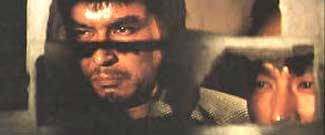 Government officials in such villages tend to be corrupt, but an inspector from Edo, inspector Jingo Odate (Gen Kimura), is feared for his honesty. Government officials in such villages tend to be corrupt, but an inspector from Edo, inspector Jingo Odate (Gen Kimura), is feared for his honesty.
Odate is on the verge of discovering the local official, greedy deviant intendant Isoda (Fujio Harumoto), is in league with the yakuza boss & has been skimming taxes among other crimes.
But when the yojimbo Kadokura kills Odate for payment of 100 ryo, it's obvious that Ichi's rapid sword is the only chance for local justice.
At a small teahouse or drinking establishment, the yojimbo buys Ichi a drink. Ichi loves sake! He says, "Sake tastes good no matter where you are or who you're with."
Kadokura repies, "Would be be so tasty if you knew it was to be your last drink?"
Ichi lowers his forehead & says, "You say when."
"Dusk!"
"Where?"
"Utsune bridge."
Thus it's settled. Ichi will have the chance to avenge his teacher. And before that duel at dusk, Ichi must redeem Nishikigi.
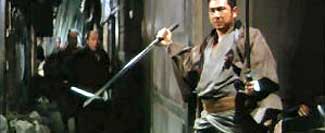 The oyabun/gangster boss suspects or at least pretends to suspect Denroku failed to trick Zatoichi on purpose due to their friendship. He declares Ichi's winnings to be Daroku's debt, just before firing him from his dicing job, yelling at him, "You're not a weasil! You're a fart!" The oyabun/gangster boss suspects or at least pretends to suspect Denroku failed to trick Zatoichi on purpose due to their friendship. He declares Ichi's winnings to be Daroku's debt, just before firing him from his dicing job, yelling at him, "You're not a weasil! You're a fart!"
He takes Daruko's daughter Tsuru for the debt. She'll be prostituted if Denroku cannot pay the money he permitted Ichi to win or bring Tatsugoro Zatoichi's canesword to make amends for his failure.
Denruko finally proves he has better character in him. He refuses to further betray Ichi, but is at a loss where he can get a hundred ryu quickly.
Tsuru's too naive to realize what horrors could be perpetrated against her. But one thing she understands: she is at risk of being separated from her father.
She is terrified of being separated from him, for she greatly loves her dad & has never been without him. She has already lost a mother, so Denroku is everything to her.
She slips away secretly to visit Ichi & steal his sword. He of course could have stopped it from happening, & she was not half as clever as she believed herself to be. But he was moved by her willingness to take any measure necessary in order to remain with her dad, & let her get away with it.
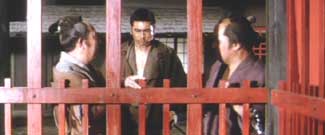 When Daruko learns what his daughter has done, at a time when enemies are descending upon Ichi, he gets drunk for shame of his own actions & of how he has influenced his daughter in learning to do wrong. When Daruko learns what his daughter has done, at a time when enemies are descending upon Ichi, he gets drunk for shame of his own actions & of how he has influenced his daughter in learning to do wrong.
By her act, her father's job as a dicer is safe, & they can be together without immediate threat to his little girl's virginity. That he has come out ahead due to such harmful actions drives him more deeply into drunken guilt.
Ichi corners him & tells him to go straight, meaning to leave the gambling world in order to give Tsuru a safer & more moral upbringing.
Denruko realizes this is indeed what he should have done long ago for Tsuru's sake. He suddenly sobers up enough to pour a drink for Ichi, & returns the canesword.
It's now just about time for the violence-fixes-everything conclusion, during which Ichi will show his dark side to be darker than usual. Danroku the Weasil will also get a pretty good fight scene, humorously imitating of Zatoichi.
[SPOILER ALERT] Ichi makes the evil oyabun Tatsugoro & the crooked intendant Isoda aka "Lord Pervert" eat the women's indenture contracts, & imposes other humiliations on them.
Ichi believes that if a woman is indentured to a bordello she has an obligation to fullfill her contract, but nothing in the contract obliges her to be beaten, starved, locked up, & generally abused. What these two men have done Ichi cannot forgive.
Isoda & Tatsugori in cowardly form begin begging "Master" Ichi for their lives. So he takes them to the prostitutes' display cage -- where he summarily executes them. [END SPOILER ALERT]
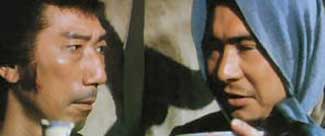 In all, the tenth feature film about Zatoichi is one of the finer episodes of a series that sustained a surprisingly strong quality throughout its long run. In all, the tenth feature film about Zatoichi is one of the finer episodes of a series that sustained a surprisingly strong quality throughout its long run.
The development of Ichi's twin nature, slow to anger when personally abused (as when the Weasil attempts to cheat him or the young girl steals his sword), his sense of injustice against the truly helpless incites a demonic wrath.
Ichi can one minute be enjoying sake like a baby enjoys its mother's breast, or a game of chance, & he's a joyous man, laughing & full of good humor.
But when he encounters needless cruelty against the innocent, dark shadows fall upon Ichi's visage, & not just one or two are bound to die, but a great many.
This capacity for monstrousness & the grim, grim look on an angry Ichi's face have by now become the series' sole admission that there's something sociopathic in seeking justice through a trail of sliced-open flesh, then moving on to the next village where he'll again be an avenging demon.
The tenth episode better than most captures Ichi's weird dichotomy of a happy forgiving nature, & a man motivated pitiless wrath.
As a minor footnote, in the trailer for Zatoichi's Revenge there are a few bits not actually in the film.
For example, a key conversation with Sayo takes place outside the storehouse cage rather than with her locked up as actually occurs in the film, so there seems to have been a revision to make her life look more horrific, though as first filmed she had made a transition to bordello life without the extreme abuse.
copyright © by Paghat the Ratgirl
|
